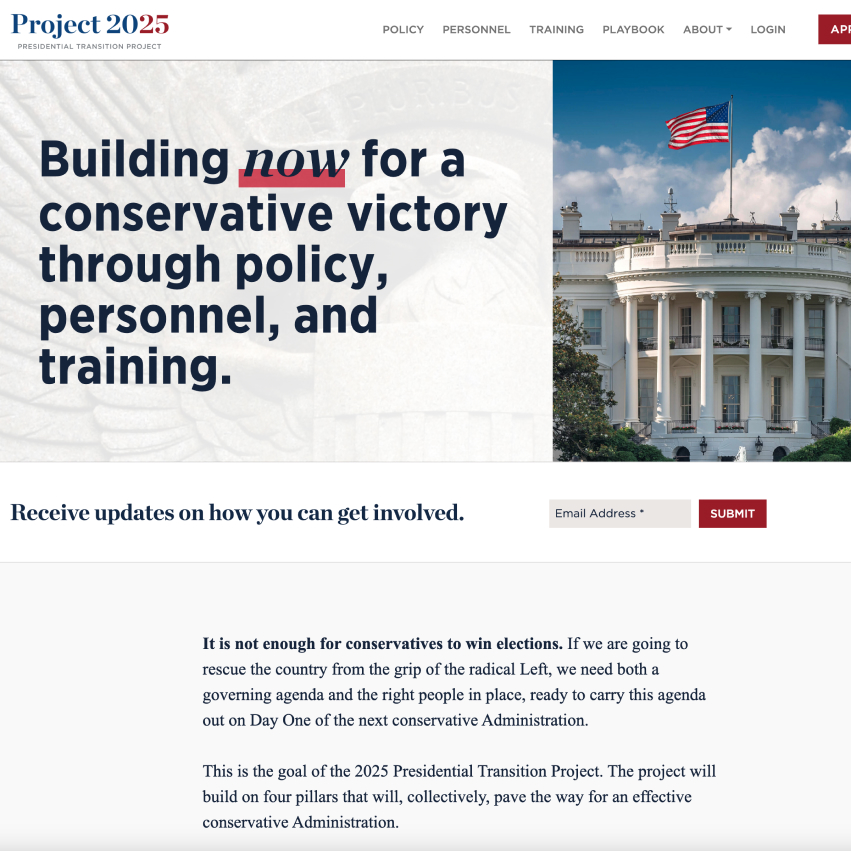Gori the Grey
The Poster
- Joined
- Jan 5, 2009
- Messages
- 13,530
So, I've started reading it.

 www.project2025.org
www.project2025.org
I'm not necessarily committing to reading it through. It's over 900 pages.
But if anyone wants to join me in a book-club-type endeavor, let me know. We'll set a pace that's agreeable to the participants. Read the chapters that people are most interested in.
I read the forward. It's 17 pages long. It has the now-infamous passage on pornography/transgenderism.
The big overall framing is that in the 70s everything sucked, but then Reagan came and fixed everything, helped by the Heritage Foundation's Mandate for America. Now also everything sucks, so "the next conservative President" guided by this manual, will fix everything again. (That's how they say it. It of course has to mean Trump, but they don't use his name)
Everything sucks now because inflation, drug overdose deaths, transgenderism and China.
But it boils down to two problems: elites and China.
Boy, they do not like elites! (Dude writing it's a Ph.D.)
There's lots to unpack, but I think I might start with the note that the forward ends on:
I learned we're living through "the Great Awokening." But also that the Great Awokening is a totalitarian cult.
Oh, maybe the most interesting thing. They go on and on about how the bureaucratic state has arisen because Congress just wants to delegate authority to agencies. They say the right way to fix this is for Congress to go back to exerting direct oversight over all regulations. But they super-quick concede that that's not going to happen, so they move straight to the President issuing executive orders. It's interesting how little trust they have in conservatives in Congress, and how much they just crave an authoritarian leader.

Project 2025 | Presidential Transition Project
Presidential Transition Project The 2025 Presidential Transition Project paves the way for an effective conservative Administration based on four pillars.
I'm not necessarily committing to reading it through. It's over 900 pages.
But if anyone wants to join me in a book-club-type endeavor, let me know. We'll set a pace that's agreeable to the participants. Read the chapters that people are most interested in.
I read the forward. It's 17 pages long. It has the now-infamous passage on pornography/transgenderism.
The big overall framing is that in the 70s everything sucked, but then Reagan came and fixed everything, helped by the Heritage Foundation's Mandate for America. Now also everything sucks, so "the next conservative President" guided by this manual, will fix everything again. (That's how they say it. It of course has to mean Trump, but they don't use his name)
Everything sucks now because inflation, drug overdose deaths, transgenderism and China.
But it boils down to two problems: elites and China.
Boy, they do not like elites! (Dude writing it's a Ph.D.)
There's lots to unpack, but I think I might start with the note that the forward ends on:
Every generation of Americans has faced and passed the test, but we're now at the point of likely complete failure. It's weird to me that they can have so positive a view of how America has always faced its problems in the past, but there's a significant likelihood that we will somehow utterly fail ("last opportunity") relative to whatever our present set of problems are (inflation, drug overdose deaths, transgenderism and China).The next conservative president will enter office on January 20, 2025, with a simple choice: greatness or failure. It
will be a daunting test, but no more so than every generation of Americans has
faced and passed.
The Conservative Promise represents the best e!ort of the conservative movement
in 2023—and the next conservative President’s last opportunity to save
our republic.
I learned we're living through "the Great Awokening." But also that the Great Awokening is a totalitarian cult.
Oh, maybe the most interesting thing. They go on and on about how the bureaucratic state has arisen because Congress just wants to delegate authority to agencies. They say the right way to fix this is for Congress to go back to exerting direct oversight over all regulations. But they super-quick concede that that's not going to happen, so they move straight to the President issuing executive orders. It's interesting how little trust they have in conservatives in Congress, and how much they just crave an authoritarian leader.
Last edited:
